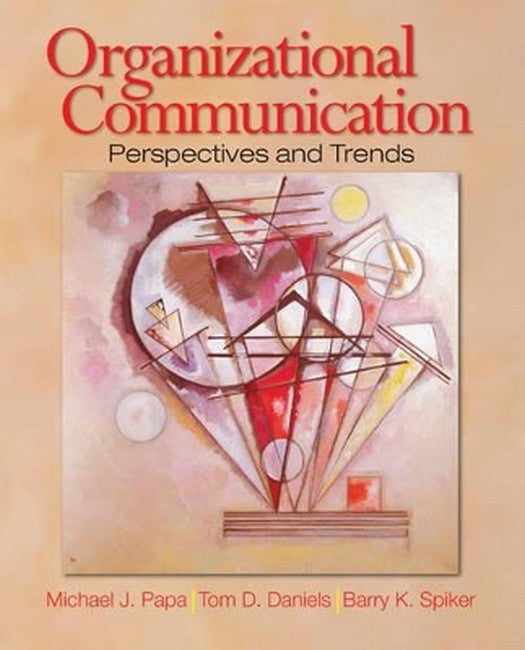Michael J. Papa (Ph.D., Temple University; M.A., Central Michigan University; B.A., St. John's University) teaches courses in organizational communication, research methods, and innovation diffusion. Papa has been involved in the design, evaluation, and documentation of various organizations for social change initiatives in Bangladesh, India, Thailand, and the U.S. In addition to this work, he has also conducted research in conflict management, group decision-making processes, management selection and development, and technology diffusion in organizations. Most recently, he has served as a consultant to The Carter Center in Atlanta, GA, documenting President Carter's approach to negotiating peace with a focus on the settlement reached between Uganda and Sudan. Papa has received ten research awards for top papers from The National Communication Association and The International Communication Association. Tom D. Daniels (Ph.D. & M.A., Ohio University; B.A., Howard Payne University) conducts research in the area of organizational communication systems and practices and regularly teaches courses in organizational communication, research methods, and statistics. Professional experience includes the following: consulting editor, Communication Quarterly; associate editor, The Ohio Speech Journal; associate editor, Quarterly Journal of Speech; editorial board member, Communication Education, Communication Quarterly and Free Speech Yearbook. Barry Spiker has nearly 25 years of experience in leading organizational change and human capital development and management. Formerly a Practice Leader and Executive at Andersen Consulting (now, Accenture), Dr Spiker was part of a team that led the design and implementation of the enterprise's Organisational Change, HR and Communications practices. Similarly, Dr Spiker served as Managing Director at Price Waterhouse (now 'PWC'), assisting in the inception of the firm's Change Integration practice. As Vice President of the TQM practice at Mercer Management Consulting, he was one of the developers of six-sigma consulting and reengineering work that accounted for nearly US$40 million in revenues. At Honeywell, Dr Spiker spent six years as an international OD and HR manager/executive consultant across multiple global business units. Dr Spiker compounds his management experience with significant consulting practice. He has developed communication strategies for several start-ups and was recently involved in the design and implementation of an integrated CRM methodology for a global trading concern and the development of an e-Transformation framework for integrating web and human capital strategies for a publicly traded eCommerce company. Among other subjects, Dr Spiker developed and/or taught courses in Consulting, Culture Change & Development, Organizational Communication, and Quantitative/Qualitative Research at the University of New Mexico, where he also served as Founding Director of the school's Institute for Organizational Research. For three years, he served as the Markley Professor of Management at Miami University teaching MBAs who awarded him twice as their graduating commencement speaker. Most recently, he served as a Senior Research Fellow at the University of Indianapolis where he completed a year-long study of mature professional workers contributory value across multiple industries. Dr. Spiker earned a PhD with emphases in Organization Communication from Ohio University. He holds a Masters degree in International Relations and a Bachelors degree (summa cum laude) in Economics/Political Science, also from Ohio University. Dr. Spiker currently is President of Better Board Governance (www.betterboardgovernance.com), he is co-founder of Million Ready Minds (www.millionreadyminds.org), a non-profit dedicated to finding the best global talent to work on projects focused on sustainability. He also is the Acting Director of Arizona State University's Consortium for Global Workforce Strategies. He is a member of the Phoenix Committee on Foreign Relations, involved with the Governor's Commission on Mature workers, loves to play golf, read history and lives with his wife Janice, an executive recruiter, and their four cats in the Sonoran desert outside of Phoenix, Arizona. He recently coauthored a new edition of his book with Michael Papa and Tom Daniels, entitled "Organizational Communication: Perspectives and Trends" (Sage publishers).
Request Academic Copy
Please copy the ISBN for submitting review copy form
Description
Preface Prologue 1. An Orientation to Organizational Communication Organization and Communication Perspectives on Organizational Communication 2. Communication and Its Functions A Precaution: Function and Structure Relationship Communication, Information, and Meaning Functions of Communication 3. Organizational Communication Structure Traditional Approach to Structure Formal Communication Informal Communication Communication Structure as a Network Interpretive Approaches to Communication Structure Critical Approaches to Communication Structure 4. Organization Theory: Prescriptions for Control Scientific and Classical Management Transitional Theories The Human Relations Movement Human Resource Development 5. Organization Theory: Metaphors of Biology System Theory Weick's Theory of Organizing Luhmann's Social Systems Theory Evolutionary Psychology 6. Organizational Theory: Communication and Culture Communication and Culture: A Way to Understand Organizations Approaches to Understanding Organizational Culture Describing Organizational Culture: The Case of Ben & Jerry's 7. Information Technology Information Technology and Change Traditional Perspective Interpretive Perspective Critical Perspective 8. Cultural Control, Diversity, and Change Cultural Control Organizational Culture and Diversity Traditional Perspectives on Cultural Control, Diversity, and Change Interpretive Perspectives on Cultural Control, Diversity, and Change Critical Perspectives on Cultural Control, Diversity, and Change The Ethics of Diversity 9. Group Relationships Traditional Perspective on Group Relationships Interpretive Perspective on Group Relationships Critical Perspective on Group Relationships 10. Leader-Member Relationships Limitations of Leadership Theory and Research Traditional Perspective Interpretive Perspective Critical Perspective 11. Power Traditional Views of Status and Power Interpretive Perspectives on Power Power in the View of Critical Theory Power and Conflict: Connected and Separate Phenomena 12. Conflict Traditional Perspectives on Conflict Interpretive Perspectives on Conflict Critical Perspectives on Conflict Ethics in Conflict 13. Strategic Communication Characteristics of Strategic Communication The Traditional Perspective The Interpretive Perspective The Critical Perspective 14. New Millennium Thought: Perspectives and Trends Perspectives on the New Millennium Traditional Perspectives and the New Millennium Interpretive Perspectives and the New Millennium Critical Perspectives and the New Millennium Trends Influencing Organizations Today

